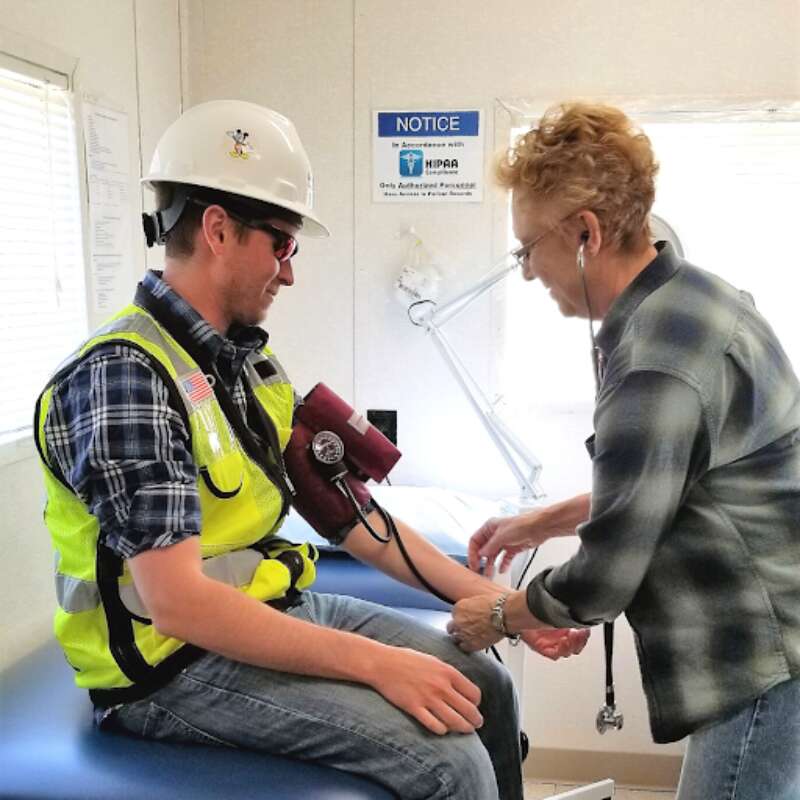An occupational health nurse plays a crucial role in treating employees in the event they are injured on the job. Occupational health nurses work on job sites to provide services like medical testing and first-aid services. If your organization is looking to work with a certified occupational health nurse, Amerisafe has a dynamic team of nurses and medical personnel who can help cover your company’s most important assets – your people.
An occupational health nurse is a licensed registered nurse who specializes in the field of occupational health and safety. Their primary role involves the prevention, assessment, and treatment of injuries, illnesses, and disabilities occurring in the workplace.
Unlike a typical nurse, an occupational health nurse possesses specialized training in areas like toxicology, industrial hygiene, ergonomics, and occupational medicine. This allows them to understand work-related hazards and recommend appropriate health programs tailored toward specific organizational needs and risks.
The day-to-day work of an occupational health nurse is multifaceted. Core responsibilities include:
Occupational health nurses proactively identify and evaluate environmental workplace hazards that could impact worker health and safety. These include chemical, biological, physical, and ergonomic risks.
After pinpointing concerns, the nurse advises management on selecting and implementing appropriate hazard controls like ventilation, safety equipment, exposure limits, job rotation schedules, or process changes.
Occupational health nurses also track employee health status over time, monitoring for early signs of work-related or aggravated illnesses. This includes conducting periodic medical examinations and reviewing health records to detect patterns.
When workplace accidents and injuries occur, occupational health nurses jump into action to rapidly assess situations and determine care priorities. After immediate first aid response, they coordinate medical treatment referrals, hospital services, rehabilitation programs, and specialty care as required.
For ongoing injury cases, occupational nurses manage patient recovery plans and facilitate return-to-work transitions. Duties range from coordinating workers’ compensation benefits to communicating health status updates with supervisors.
Educating workers on health topics also falls under an occupational nurse’s domain. They instruct employees on injury prevention, safe work practices, chronic condition self-management, smoking cessation, nutrition, fitness, and more.
Workplaces with safety-sensitive operations often conduct drug tests and alcohol screening per DOT regulations or organizational policies. Specimen collection, lab coordination, result interpretation, and employee counseling around substance abuse are common occupational health nurse duties.


Beyond general responsibilities, some occupational health nurses gain expertise in niche disciplines like:
Some large companies offer onsite medical clinics providing urgent care, dental visits, physical therapy, and preventative screenings right at employee workplaces. Occupational health nurse practitioners often staff and manage these facilities.
Certain occupational health nurses receive specialized industrial hygiene training on identifying chemical, radiological, and biological agents in the workplace. They then help recommend and validate safety measures for hazardous environments.
To prevent repetitive strain disorders, occupational health nurses skilled in ergonomics systematically evaluate workstations, equipment, layouts, movements, and more. After pinpointing risks for injury, they provide specific postural and workplace design improvement ideas.
Specially trained occupational health RNs often coordinate return-to-work and disability management programs. Duties involve facilitating transitions, modified duty arrangements, attendance monitoring, and health education for high-risk groups like employees with chronic medical conditions.
During infectious disease outbreaks, occupational health experts play a pivotal role in developing exposure-prevention guidelines and response plans for workplace settings in coordination with public health authorities.
While employee well-being is an obvious advantage, having an occupational health nurse on staff also offers organizations tangible benefits, including:
By implementing health programs customized towards workplace risks, occupational health nurses reduce absenteeism and presenteeism losses associated with poor health. Data from the Centers for Disease Control and Prevention suggests that every dollar a company invests in workplace health delivers a return of $1.20-$4.60.
Proactive occupational health efforts minimize workplace incidents and accompanying workers’ compensation claims. This avoids premium hikes and reduces recordable injury rates used by insurance carriers to set policy prices.
Satisfaction and loyalty increase when staff feel companies prioritize their health, safety, and overall well-being. When employees feel valued and protected, they may be more likely to stay at their workplace, reducing turnover.
Organizations employing occupational health nurses signal their commitment to safety and corporate responsibility – increasingly critical factors driving consumer purchasing decisions and public perception.
Occupational health experts ensure company health and safety management systems meet rigorous legal and regulatory standards enforced by OSHA, NIOSH, and similar state authorities. This prevents risky non-compliance exposures that could lead to fines, shutdowns, and litigation expenses.

As top occupational medicine specialists, Amerisafe’s team possesses sharp critical thinking abilities, emotional intelligence, and dedication to optimal employee health outcomes. Our onsite nursing professionals and physician assistants are committed to delivering the best quality care possible. Whether you need occupational health nursing experts to integrate a workplace solution or you need assistance with pre-employment drug screenings, we have a variety of offerings.
Amerisafe’s nurses leverage insight from medical surveillance trends, injury patterns, employee feedback, and more to pinpoint the biggest opportunities for workplace health improvements unique to each organization. Solutions are then customized based on effectiveness and viability given clients’ risk profiles, resources, and business objectives.
With decades of combined occupational health experience, Amerisafe’s nursing team holds certifications across specialties like case management, workplace wellness, toxicology, and ergonomics. Ongoing professional development ensures they stay abreast of the latest evidence-based practices and clinical guidelines.
The Amerisafe team recognizes the need for proper and urgent care of injured employees so they can make a timely return to work. Our medical team is properly trained and certified to make accurate observations, determine appropriate interventions, and help you create and maintain a safe work environment.
If you’re interested in working with the experts at Amerisafe to advance your organizational health goals, contact us today.
Occupational health nurses must complete RN degrees, hold current nursing licenses, and pursue occupational health nurse certification. Most have bachelor’s degrees and background experience in specialty areas like critical care, case management, or emergency nursing.
Any high-risk industry like construction, healthcare, manufacturing, oil and gas could benefit from an occupational nurse. Large organizations, government agencies, and unions also employ them to oversee complex employee health programs.
Occupational health nurses cannot prescribe per scope of practice rules. However, they can recommend over-the-counter treatments, coordinate prescription plans with doctors, and provide guidance on medication administration/effects.
Occupational health nurses who work for staffing agencies or as independent consultants often split their time providing services at various client organization sites. In-house company nurses typically report to one main workplace location daily.
Read the announcement here.